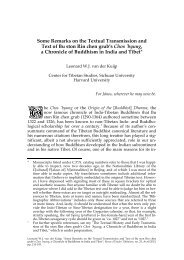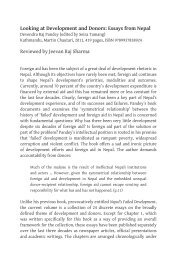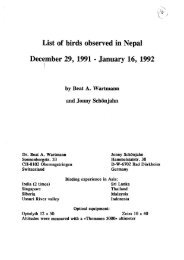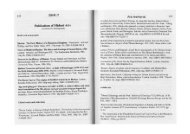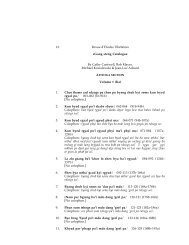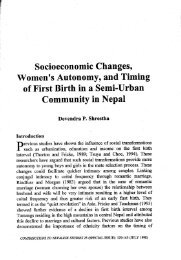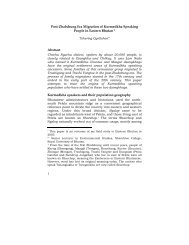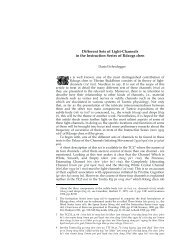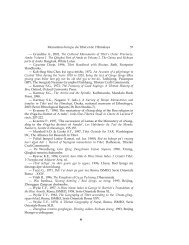You also want an ePaper? Increase the reach of your titles
YUMPU automatically turns print PDFs into web optimized ePapers that Google loves.
A Little Word<br />
Every now and then, newspapers carry reports about women and,<br />
sometimes, men being persecuted on charges of witchcraft.<br />
Generally, these victims tend to be living on their own, and so<br />
when the community rises up against them in a frenzy, there is no one to<br />
speak out for them. We in Kathmandu come to know of these incidents<br />
if the local stringer gets wind of it and files a story. Human rights organizations<br />
quickly come forward to document the case, but often nothing<br />
comes out of it and soon everyone goes back to their lives as if nothing<br />
had happened.<br />
The immediate reaction in the press is usually of righteous indignation<br />
that such things should take place in this day and age, and this is<br />
vented occasionally by various writers in their columns. These writings<br />
often blame the ignorance of<br />
the villagers in believing that<br />
someone’s ‘evil eye’ could be<br />
the source of their misfortune<br />
which could be anything from<br />
chronic illness and death of a<br />
person to something as mundane<br />
as the drying up of a cow’s<br />
udders.<br />
Here, one would like to ask<br />
how are these ‘ignorant’ perpetrators<br />
any different from the<br />
more ‘enlightened’ members of<br />
our society. Let’s take one shining<br />
example. When Sher<br />
Bahadur Deuba became prime<br />
minister in July 2001, the country<br />
had lost its head of state in a<br />
gruesome massacre, the<br />
Maoist onslaught had renewed,<br />
and Girija Prasad Koirala had<br />
resigned as prime minister.<br />
Deuba had won the contest to<br />
lead his party’s government. But<br />
what did he do? He left the country rudderless for five whole days while,<br />
as was reported then, his astrologers tried to figure out the most ‘auspicious’<br />
time for him to take the oath of office. Whoever his astrologers are,<br />
they must have felt rather sheepish when 14 months later, Deuba was<br />
ignominiously booted out with the tag of ‘incompetence’ to haunt him<br />
forever. It is a different matter that his incompetence was in reference to<br />
his inability to hold elections in the promised time.<br />
With such trendsetters, why should it shock us that some unfortunates<br />
consider a neighbor to be a witch? It is a thin line to cross from<br />
34<br />
Of Witchcraft And Witches<br />
It is a thin line to cross from believing that the stars rule our lives to<br />
being convinced that someone is the cause of our misfortunes. Our life<br />
is ruled by irrationality and we follow most of it without thinking twice<br />
BY DEEPAK THAPA<br />
believing that the stars rule our lives to being convinced that someone is<br />
the cause of our misfortunes. Our entire life is ruled by irrationality and we<br />
follow most of it without thinking twice. We conduct rituals while buying<br />
land or laying the foundation to a house, moving shop or going on a<br />
journey. There are injunctions of what we are to do or not to do: no<br />
whistling indoors, no sweeping after the sun goes down, no setting out on<br />
a journey on Saturday, and so on and on. Then there is the ‘auspicious’<br />
time for everything: from naming a child to getting married to taking up<br />
office. People also develop individual idiosyncrasies. Wearing a particular<br />
kind of ring, or often rings, fasting on fixed times of the week, a<br />
penchant for doing things on particular days, all in the hope that it will<br />
ward off bad luck. These are examples of, to borrow Pakistani thinker<br />
Eqbal Ahmad’s words, a mediaeval mindset at work.<br />
One can well argue that<br />
these are questions of personal<br />
belief and undue comment is<br />
unwarranted. It certainly is, but it<br />
is this kind of behavior that is at<br />
the root of all superstition and<br />
can certainly not contribute positively<br />
to the health of a society.<br />
So long as we allow ourselves to<br />
be guided by the supernatural,<br />
we will constantly be looking over<br />
our shoulders even as we try to<br />
create a modern society driven<br />
by rational thought. For instance,<br />
the same newspapers which<br />
preach against superstitious belief<br />
continue to propagate superstition<br />
through its pages every<br />
day, i.e., through the horoscope<br />
columns. Practically every newspaper<br />
or magazine has an astrologer<br />
predicting what is in store<br />
for the readers that day, that<br />
week or that month, as the case<br />
may be. Since there is specialist literature available for those who cannot do<br />
without knowing what they think the future holds for them, it fails reason why<br />
the general media should also be involved in soothsaying.<br />
Having said all this, something interesting happened during the recent<br />
Indian elections that was reported in passing by the Indian press.<br />
Apparently, having arrived earlier, Sonia Gandhi had hung around the<br />
polling station waiting for a less ‘inauspicious’ time to cast her vote. Days<br />
later she was vaulted to the prime minister’s chair. Now, that sure is one<br />
big boost for obscurantism.<br />
MAY 30, 2004 | nation weekly






